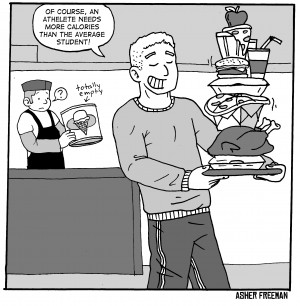
The NCAA Board of Directors has a big decision ahead of it that could forever change the lives of student-athletes. Current rules require schools to provide three meals per day to scholarship athletes. The rules also allow for schools to give athletes snacks as well.
The proposed changes would allow schools to give both scholarship and walk-on athletes unlimited meals. If passed this summer, the changes would take effect on Aug. 1.
Talks of changing meal rules have been simmering for a while because of the somewhat arbitrary nature of the current rules.
For example, the current rules allow athletes to receive a bagel because a bagel is considered a snack. As soon as a spread, such as cream cheese or butter, is added to the bagel, then it is considered a meal for some reason.
What pushed the idea of changing the rule to the forefront of the Board of Directors’ minds was the comment University of Connecticut guard Shabazz Napier made during the NCAA Tournament.
“I don’t feel student-athletes should get hundreds of thousands of dollars, but like I said, there are hungry nights that I go to bed, and I’m starving,” Napier said.
Athletes do need more than three meals each day because of the energy they exert during and in preparation for their athletic activities. The NCAA needed to throw its ridiculous rules about snacks and meals away in favor of new ones because the current rules make no sense. Walk-on athletes deserve meals from the athletic programs they represent. Giving athletes unlimited meals, however, is not the appropriate solution to any of these issues.
If the NCAA changes its rules, it will first have to iron out exactly what “unlimited” means. Will athletes get blank checks to go eat wherever they desire? Will schools be able to spend an unlimited amount of money on team-wide meals? Or will athletes be given unlimited admittance into the school’s dining halls?
Each of these scenarios looks very different from the others, but all would qualify as giving athletes unlimited meals.
Whether it is right or not, athletics are one of the main focal points of most major universities in the United States. Schools get ahead in athletics by recruiting.
If the rules on meals change, it would be a pretty safe bet to say schools that can afford to give more will use their deep pockets to provide everything the rules permit to athletes.
All of this will just further distract from what universities are supposed to be about: education. High school recruits should pick a school based largely on its academics, not based on whether the athletic program provides its athletes with more or better food than other athletic programs.
Scholarship athletes are very well compensated for their services to the university. In addition to scholarship money, athletic gear, stipends, meals, access to top-notch facilities and private academic tutors, is it right to increase their meal plans to an unlimited amount?
Food allowance is a problem, but the answer is not unlimited meals. It’s too easy to exploit and cannot be reasonably implemented.
Athletes do, however, often need more than the current rules allow.
A simpler solution would be to increase the meal allowance to four meals and clearly define which snacks schools are allowed to give athletes without having cream cheese be a determining factor.


![UnlimitedMeals[1]](https://baylorlariat.com/wp-content/uploads/2014/04/UnlimitedMeals1.jpg)



